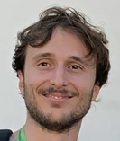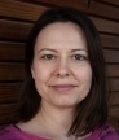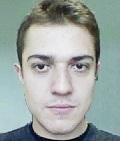 |
Federico Boschetti graduated in Classics at the University “Ca’ Foscari” of Venice in 1998. He got his PhD in Classical Philology jointly at the University of Trento and the University of Lille III in 2005 (thesis: “Essay of computer-assisted linguistic and stylistic analyses of the Aeschylus’ Persae”). He also got a PhD in Cognitive and Brain Sciences – Language, Interaction and Computation at the University of Trento in 2010 (thesis: “A Corpus-based Approach to Philological Issues”). Since 2011 he has been a researcher at the Institute of Computational Linguistics “A. Zampolli” of the CNR of Pisa (CNR-ILC). Currently he works at the detached research unit of the CNR-ILC close of the Venice Centre for Digital and Public Humanities (VeDPH) of the University Ca’ Foscari in Venice. His research interests are: Digital Philology, Collaborative and Cooperative Philology, Historical OCR and Distributional Semantics applied to ancient texts. |
 |
Fabio Carrara is a researcher at the Artificial Intelligence for Multimedia and Humanities Laboratory (AIMH) of the Information Science and Technologies Institute (ISTI) of the Italian CNR in Pisa. He received a Master’s Degree and a Ph.D. in Computer Engineering from the University of Pisa (Italy) respectively in 2015 and 2019. His research interests include deep learning for multimedia data with a focus on visual perception, image classification, content-based and cross-media image retrieval and analysis. |
 |
Vittore Casarosa graduated in Electronic Engineering at the University of Pisa and spent a few years at a research center of the Italian National Research Council, doing research on “Electronic Computers” (that center is today ISTI, the Institute for Science and Technology in Informatics). He then joined IBM, spending many years in the R&D laboratories of IBM in Italy, France and in the US, doing and managing research mostly in image processing and networking. Since 2000 he is Senior Research Associate of the Italian National Research Council at ISTI, where he is associated with the activities of the Multimedia Laboratory in the field of Digital Libraries; from 2000 to 2007 he has been Deputy Director of DELOS, the Network of Excellence on Digital Libraries. Vittore has been teaching at the University of Pisa (Department of Engineering), at the University of Parma (Department of Philosophy) and at the Open University of Bolzano (department of Computer Science). Presently he is teaching a course on Digital Libraries at the University of Pisa (department of Digital Humanities). |
 |
Francesca Frontini obtained a PhD the University of Pavia with a thesis on corpus linguistics; she was a post-doctoral researcher the Institute for Computational Linguistics in Pisa ILC-CNR), working on several European projects with a focus on computational lexicography and natural language processing. She was later associate professor at Université Paul-Valéry & CNRS in Montpellier, where she worked among other things on the MeDo project, contributing to the creation of a model for the representation and annotation of wastewater related facts and events, to be automatically extracted from texts. Today she is a Research Scientist at ILC-CNR and member of the Board of Directors of the European CLARIN ERIC infrastructure, as well as an ISO expert. Her research interests lie in Language Resources, Named Entity Recognition and textual analysis as well as linguistic knowledge representation. In addition, she has published extensively on issues relating to language resource documentation, preservation and standardisation. |
 |
Nicola Messina is currently a post-doc at the Artificial Intelligence for Multimedia and Humanities Laboratory (AIMH) of the Information Science and Technologies Institute (ISTI) of the Italian CNR in Pisa. He received his Master’s Degree in Computer Engineering in 2018 at the University of Pisa and recently received his Ph.D. in Information Engineering from the same university. He is presently researching deep learning methods for relational understanding in multimedia data, with particular emphasis on transformer-based architectures for effective and efficient cross-modal analysis and retrieval on images, texts, and videos. He is also interested in attentive deep learning models for anomaly detection, abstract visual reasoning, and surveillance video analysis. |
 |
Monica Monachini is a Research Director at CNR-ILC and the head of LaRI, the Language Resources and Infrastructures group at ILC. She is also the national coordinator of CLARIN-IT, the Italian node of the CLARIN-ERIC European research infrastructure. Her research interests include language resources with emphasis on lexicons, ontologies, terminologies also including metadata, standards, models and formats for publishing Linguistic Linked Open data. She currently represents CNR in the UNI Terminology Committee and in the EOSC task force Community Engagement. She has participated and participates in many national and international INFRA-EOSC initiatives. She is member of the PhD Board “Technologies and the Humanities” at the University of Macerata and carries out training activities. |
 |
Alejandro Moreo is a Researcher at the Institute for the Science and Technologies of Information of the Italian National Council of Research (ISTI-CNR). He has obtained a PhD in Computer Science and Information Technologies from the University of Granada, Spain, in 2013. His research interests lie at the interface of data mining and machine learning, with particular emphasis on deep learning, representation learning, and transfer learning for cross-lingual text classification. He has taught several programming courses at the University of Granada, a course on Text Mining for the MSc program in Data Science at the University of Pisa, a course on text classification and sentiment analysis at AFIRM 2019, tutorials on learning to quantify at SIGIR 2019 and SocInfo 2020, and a course on Machine Learning for Automatic Text Analysis for the PhD program in Brain, Mind, and Computer Sciences at the University of Padova. A list of his publications is at https://goo.gl/hShSn8 |
 |
Seamus Ross is Professor in the Faculty of Information at the University of Toronto and served as Dean for seven years (2009-2015). During 2015 and 2016 he served as Interim Director of the Marshall McLuhan Centre for Culture and Technology. Before joining Toronto, he was Professor of Humanities Informatics and Digital Curation and Founding Director of HATII (Humanities Advanced Technology and Information Institute) at the University of Glasgow (1997-2009). He served as Associate Director of the Digital Curation Centre in the U.K. (2004-2009) and was Principal Director of ERPANET (2001-2004) and Digital Preservation Europe (DPE) (2006-2009). He has been principal investigator in a number of international projects, such as the DELOS Digital Libraries Network of Excellence (2004-2007), Planets (2006-2010), and Digicult Forum (2002-2004). His main research interests are in the fields of Digital Preservation and Curation, Digital Humanities, digitization, digital repositories, emulation, digital archaeology, semantic extraction and genre classification, cultural heritage informatics and knowledge representation and reasoning. He is the author of a number of papers published in international journal, such as studies of “Digital Archaeology” and forensic storage formats, examination of digital preservation and archival science, and introduction to digital preservation. He also promotes broadening access to scholarship and was instrumental in the creation of the Digiman Animation Series by DigitalPreservationEurope (e.g., 2009 video Digital Preservation and Nuclear Disaster: An Animation ). Go to Web site |
 |
Roberto Rosselli Del Turco is an Assistant Professor at the Università degli studi di Torino, where he teaches Germanic Philology, and also an Assistant Professor of Digital Humanities at the University of Pisa. He is the editor of the Digital Vercelli Book (http://vbd.humnet.unipi.it/), an ongoing project that aims at providing a full edition of this important manuscript. To further the DVB project he created Edition Visualization Technology (EVT), a software tool to navigate and visualize digital editions developed at the University of Pisa (http://evt.labcd.unipi.it/). Roberto is also co-director of the Visionary Cross project (http://vcg.isti.cnr.it/activities/visionarycross/), an international project aiming at producing an advanced multimedia edition of key Anglo-Saxon texts and monuments. |
 |
Enrica Salvatori is Associated Professor in the Department of Civilization and Knowledge of at the University of Pisa, where she teaches Medieval History, History of Late Ancient and Medieval Settlements and Digital Public History. Vice President of the degree course in Informatica Umanistica (Digital Humanities) at the same University from 2006 to 2010; Visiting Professor at the University P. Valéry (Montpellier, France) in 2006, 2008, 2011 and 2015; from 2015 to 2021 Director of the Laboratorio di Cultura Digitale (LabCD, Digital Culture Laboratory – http://labcd.humnet.unipi.it/) and now scientific manager of the Multimedial Service of the University of Pisa. Previously in the board of AIUCD (Italian Association of Digital Culture; 2015-2021), she is now in the board of AIPH (Italian Association of Public History 2017-..) and of PHW (Public History Weekly). Her research interests are focused on Medieval History and Digital Humanities, in mutual connection. Much of his work has been on the medieval Mediterranean circulation, the evolution of the municipality in Italy and Provence and the history of Lunigiana (northern Tuscany), as well as the study of the Digital Public History as a discipline. In particular, she has led since 2011 a research team on the history and archeology of the landscape in Val di Vara and Lunigiana (http://tramonti.labcd.unipi.it/) and since 2014 the digital edition of the Pelavicino Code (http://pelavicino.labcd.unipi.it/), structured as a Digital Public History project. |
 |
Fabrizio Sebastiani is a Director of Research at the Institute for the Science and Technologies of Information of the Italian National Council of Research (ISTI-CNR); formerly he was an Associate Professor at the Department of Pure and Applied Mathematics of the University of Padova, Italy (2005/06), and a Principal Scientist at the Qatar Computing Research Institute (2014/16). His research interests lie at the interface of data mining, machine learning, information retrieval, and natural language processing, with particular emphasis on text classification, authorship analysis, technology-assisted review, and learning to quantify. On the topics of this course Fabrizio has done active research for more than 20 years. On the same topics, he has extensive experience in delivering courses at graduate level, tutorials at international conferences, and courses at summer schools. A list of his publications is at https://goo.gl/nfxkFd |
 |
Rachele Sprugnoli Rachele Sprugnoli is researcher at the University of Parma, member of the executive committee of AIUCD (the Italian association of Digital Humanities) and publicity co-chair of AILC (the Italian association of Computational Linguistics). She obtained her bachelor’s and master’s degrees in Humanities Computing at the University of Pisa and her PhD in Information Technology at the University of Trento. She worked at Fondazione Bruno Kessler in Trento and at the Catholic University of the Sacred Heart in Milan. Her research is mainly focused on linguistic annotation, evaluation of NLP tools and on how computational methods can be applied to the treatment of cultural content. |

